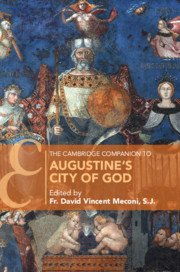Book contents
- The Cambridge Companion to Augustine’s City of God
- Cambridge Companions to Religion
- The Cambridge Companion to Augustine’s City of God
- Copyright page
- Dedication
- Contents
- Notes on Contributors
- Preface
- Abbreviations: Works by Augustine
- 1 Introduction
- 2 Book 1
- 3 Book 2
- 4 Book 3
- 5 Books 4 & 5
- 6 Books 6 & 7
- 7 Books 8–10
- 8 Books 11 & 12
- 9 Books 13 & 14
- 10 Books 15 & 16
- 11 Books 17 & 18
- 12 Book 19
- 13 Book 20
- 14 Books 21 & 22
- 15 Epilogue
- References
- Index
- References
5 - Books 4 & 5
Roman Religion and Just Power
Published online by Cambridge University Press: 21 August 2021
- The Cambridge Companion to Augustine’s City of God
- Cambridge Companions to Religion
- The Cambridge Companion to Augustine’s City of God
- Copyright page
- Dedication
- Contents
- Notes on Contributors
- Preface
- Abbreviations: Works by Augustine
- 1 Introduction
- 2 Book 1
- 3 Book 2
- 4 Book 3
- 5 Books 4 & 5
- 6 Books 6 & 7
- 7 Books 8–10
- 8 Books 11 & 12
- 9 Books 13 & 14
- 10 Books 15 & 16
- 11 Books 17 & 18
- 12 Book 19
- 13 Book 20
- 14 Books 21 & 22
- 15 Epilogue
- References
- Index
- References
Summary
In the first three books of City of God, Augustine begins to defend Christianity against those who blame it for the sack of Rome. More specifically, Augustine is responding to both the written theological questions of the pagan Volusian, the proconsul of Africa (ep. 135), and Volusian’s spoken concerns relayed by his Christian friend, Marcellinus (ep. 136), that Christianity and Roman citizenship were incompatible. In his aim of exonerating the Christians from blame for Rome’s fall, Augustine, as Markus suggests, speaks of Rome “as an outsider.” But Rome plays a more complicated role in Augustine’s argument. For Augustine, we are a complex amalgam of experiences, memories, habits, affections, dispositions, and reason, all of which shape, both consciously and subconsciously, what we love. “To have a past,” as Wetzel observes, is “to admit grief into wisdom.” Augustine shares with his audience many of the same affective memories derived from his Roman upbringing and education. One need only recall Augustine’s recollection of how Virgil moved him to tears as a youth (conf. 1.13.20–21). Books 4 and 5 read not as a break from this Roman past, but as a recasting of memory. Citing Roman sources along the way, Augustine detaches paganism from romanticized images of Rome’s past, showing that traditional Roman religious practices not only fail to account for Roman successes, but also are the contrivance of elites used to conceal their criminality and justify domination.
- Type
- Chapter
- Information
- The Cambridge Companion to Augustine's City of God , pp. 81 - 101Publisher: Cambridge University PressPrint publication year: 2021
References
Further Reading
- 1
- Cited by

